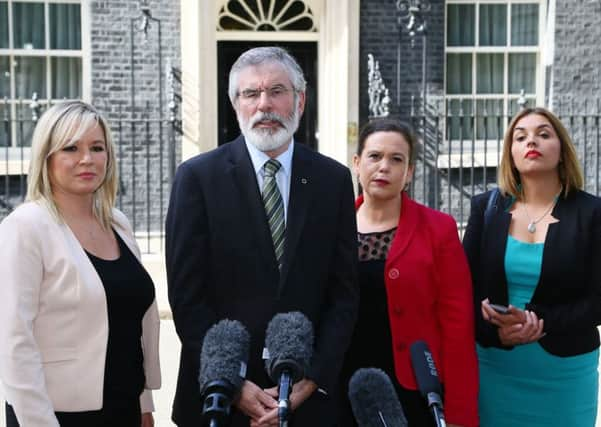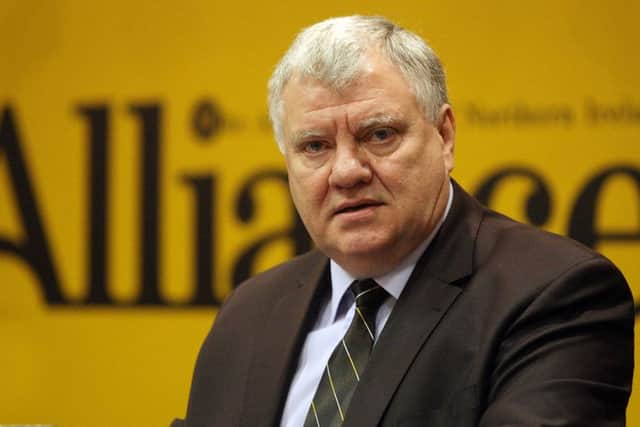John Cushnahan: Instead of chasing the moonbeam of Irish unity, SF should restore Stormont


My concerns were eased by the response of all major political parties throughout Ireland to work together to minimise the dangers and considerable progress was being made.
Unfortunately, the result of the recent UK general election has added new political uncertainties to the mix just as the Brexit negotiations were about to commence. The expectation of an agreed alliance between the DUP and Theresa May to support a pro Brexit minority Conservative government adds a new dynamic to the situation.
Advertisement
Hide AdAdvertisement
Hide AdIt therefore came as no surprise that Fianna Fail leader, Micheal Martin called on Sinn Fein to end their policy of abstentionism and take their seats in the Westminster Parliament because “Brexit is the single greatest issue facing our generation.” Ending a policy of abstentionism was not something that would be new to Sinn Fein. Its decision to end abstentionism for the Dail was made in 1986. Similarly, its abstentionist policy towards participation in Stormont (which after all is a British political institution) ended in the 1990s. Therefore, it a tactical issue rather than one based on principle.


The reaction of Sinn Fein Deputy Leader Mary Lou Mc Donald was both alarming and revealing. In her rejection of Martin’s proposal, she said “we are entering the endgame of partition which is spurred on by the logic of Irish unity in the wake of Brexit.” This was in keeping with the reaction of her leader Gerry Adams whose response to the Northern Ireland election results was that “a referendum on Irish unity is now inevitable because of a dramatic shift among Northern Ireland voters”.
Such statements are deliberately mischievous and provocative and are not confirmed by any objective analysis of the outcome of the general election. There are many reasons why there is little prospect of a border poll/ referendum taking place in the foreseeable future.
Firstly, since the 2017 March Assembly election there has been no dramatic shift in support for nationalist parties. In fact, the gap between the two unionist parties and the two nationalist parties has widened in favour of unionism. In March 2017 that gap was 1.2%. In June 2017, it was 5.2% and if you were to add the vote for North Down MP, Lady Hermon, the gap would be 7.2%. Furthermore, unionists won 11 seats, nationalists only won seven.
Advertisement
Hide AdAdvertisement
Hide AdThe reason for the increase in the overall unionist vote was a direct response to the triumphalism of Gerry Adams after the 2017 Assembly election when he claimed that “the perpetual unionist majority was ended”. This guaranteed increased unionist participation in the voting process would not be as low again. Based on the actual statistics and not Mr Adams false claim of a “dramatic shift of voters” a divisive border poll would most certainly confirm the constitutional status quo.


Secondly, the Westminster election results in Scotland has (in the view of all political commentators and analysts in that country) ensured that there is little or no prospect of a second referendum on Scottish independence taking place. This has clear negative consequences for the prospect of a border poll taking place in Northern Ireland.
Thirdly, if there is an agreement between the DUP and Theresa May on supporting a minority government led by her it is safe to assume that the DUP will seek an understanding that a border poll will not be held.
It is therefore clear that in the wake of the recent British general election, Brexit will not lead to Irish unity. What is not so clear is what impact the current political uncertainty that now exists at Westminster will have on Irish interests north and south.
Advertisement
Hide AdAdvertisement
Hide AdThe priority therefore is to ensure that putting Northern Ireland’s case is not simply left in the hands of the DUP alone who are pro Brexit. It must be an inclusive project involving all shades of political opinion in Northern Ireland and because of Sinn Fein abstentionism that can only be achieved by the restoration of a Power Sharing Executive working together to make the case for Northern Ireland as the Brexit negotiations continue.
Instead of chasing the political moonbeam of imminent Irish unity, restoration of power sharing should be the Sinn Fein priority which would also allay the suspicions that exist that they are no longer committed to this aspect of the Good Friday Agreement.
• John Cushnahan is a former Fine Gael MEP and former Alliance Party leader